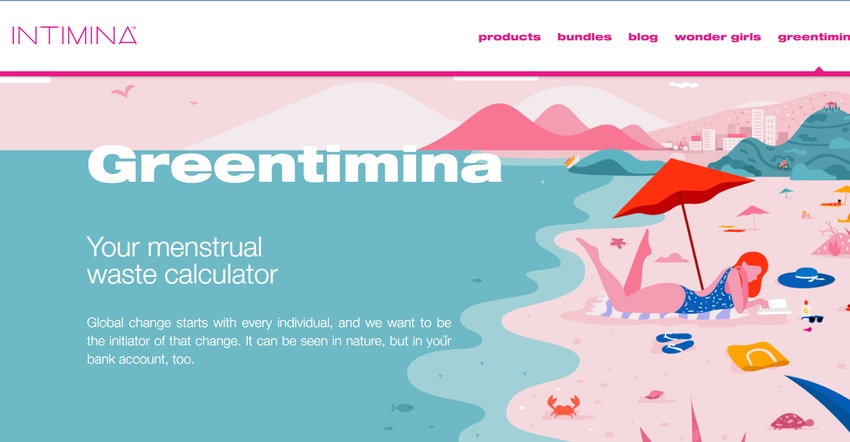Swedish Company Aims to Reduce Feminine Product Waste

Although not often discussed, women spend an average of $6,000 on disposable menstrual products while 11,000 disposable menstrual products end up in the world's oceans and landfills. A Swedish, global fem-tech company with U.S. headquarters in San Jose, Calif., has created a waste calculator that shows women how much they are spending on one-time period products and how much waste they are accumulating.
INTIMINA’s new Greentimina Waste Calculator is a tool that calculates the amount of waste a person produces by using non-reusable menstrual products, such as pads and tampons, during their lifetime. It also estimates how much money a person will spend on those products.
“Our mission is to provide a comprehensive collection of products and information for women at every stage of life, from the first menstruation to beyond menopause,” says Erica Minor, manager of marketing and communications North America for INTIMINA. “In addition to normalizing issues surrounding women's health and menstruation, we are committed to bettering the plant through social responsibility and waste reduction initiatives. We regularly partner with period poverty charities to ensure equal access to period products all over the world.”
About 93% of menstruators willing to opt for sustainable menstruation, according to a recent INTIMINA survey of 1,442 participants.
“The (Greentimina Waste Calculator) concept is eye opening and the numbers as related to waste and landfills are absolutely staggering. Seems an awareness campaign and education is needed on this front since I would imagine these stats would be shocking to most,” says Dr. Alyssa Dweck, OBGYN and INTIMINA’s Sexual and Reproductive Health expert.
According to Minor, the goal of the Greentimina Menstrual Waste Calculator is to acknowledge the problem of pollution from single-use period products, raise awareness and invite global change. Additionally, it educates menstruators and guides them towards a reusable, sustainable and economical period solution.
In addition to the Greentimina Menstrual Calculator, INTIMINA also produces a reusable menstrual cup line.
“We recognized that due to differences in cervical height, we needed to expand beyond the standard one cup two sizes model,” says Minor. “Our cups were created to accommodate different bodies and types of flow offering menstruators the confidence, hygiene and comfort that they deserve during their period.”
The INTIMINA menstrual cup line is made from soft, medical grade silicone with products created to support experienced menstrual cup users and first-timers alike. The line also includes the first re-usable, flat-fit menstrual disc.
INTIMINA products are available on Intimina.com as well as Amazon, CVS, Walgreens, Target and other specialty retailers.
“Reusable menstrual products, like INTIMINA’s menstrual cup line are extremely beneficial for the environment as well as cost-savings because they can last for years,” she says. “Soap and water is all that is needed to keep the cup clean for up to 10 years of use. Combined, reusable menstrual products significantly cut back on single-use menstrual products due to their safety and longevity. They can be worn for up to 8 hours reducing trips to the bathrooms and leaks. Also, since they are made from medical grade silicone it is a cleaner and healthier period solution as menstrual blood is not being re-absorbed through contact with body tissues.”
“Menstrual cups are reusable and can last for years and years,” says Dr. Dweck. “I find that my patients, especially those millennial age and younger are quite conscious of the environment impacts of disposable menstrual products and waste and sustainability is extremely important to them.”
INTIMINA works directly with a team of medical experts to shed light on women’s health issues on its blog and social media channels.
“In addition to sustainability, we seek to end the shame, stigma and misinformation surrounding menstruation and other women’s health issues through education and advocacy,” says Minor.
About the Author(s)
You May Also Like


